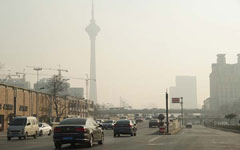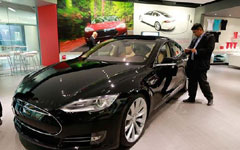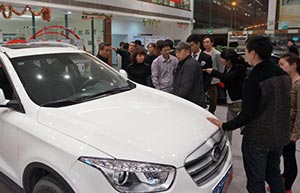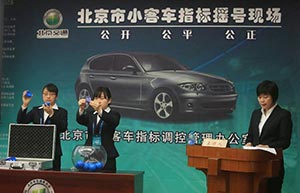Nanjing has seen a rash of car purchases recently because of residents fears that a car-purchase limit policy similar to
But a Jiangsu provincial government official said the city can't impose a quota immediately because such a policy would require the approval of the provincial People's Congress. Residents of Jiangsu's capital are lining up in front of auto management departments to have their cars registered, as widespread rumors and reports say the city might introduce immediate quotas on license plates. The provincial auto management department offices in Nanjing have recently seen a combined 1,500 people a day-twice the usual number-applying for license plates. Workers say they have had to work until 9 pm and cancel their lunch breaks to keep up with the workload.
|
 |
|
 |
Lin followed her friend's advice and bought a vehicle in April.
"A worker at the store told me it's lucky for me that he still has cars to sell, and I should forget about the discount and choosing a color," she said.
Some retailers at the Nanjing International Auto Expo, which was held from Wednesday through Sunday, could sell a vehicle in five minutes.
On March 26, Hangzhou, in neighboring Zhejiang province, created a controversy when it restricted the issue of new car licenses overnight-one day after the local government refuted the news that a license plate quota policy would be imposed.
Five other Chinese cities-Shanghai, Beijing, Guangzhou, Tianjin and Guiyang-also have license plate quotas.
Of the six, Beijing and Guiyang issue plates via a lottery procedure, while Shanghai employs a bidding system. Guangzhou, Tianjin and Hangzhou use both systems.
Residents of Xiamen, Fujian province, and Zhengzhou, Henan province, have also heard about the possible restrictions on the issuing of license plates.
Local governments of the two cities have denied any such plans.
Liu Kexi, deputy director of the legislation committee of the Jiangsu People's Congress, said that the province and its cities will not suddenly impose a car plate quota as Hangzhou did.
"Unlike Zhejiang province, Jiangsu province has a specific regulation on vehicle number control measures, including quotas on license plates and a plate-bidding procedure," Liu said. "All of the province's 13 cities, including Nanjing, have to go through hearings and a 30-day publicity period before imposing a plate quota.
"Any quota imposed immediately in the province would be illegal, and those involved would be punished," Liu said. "Jiangsu will definitely not act like Hangzhou, and there's no need for local residents to rush to auto dealers."
|
 |
 |
